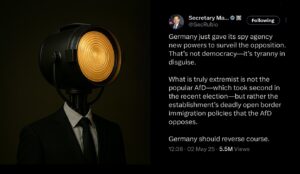⚡ Cutting through noise. Spotlighting the truth.
“Tyranny in Disguise”: Rubio Slams Germany’s AfD Crackdown

Germany’s decision to classify the right-wing Alternative for Germany (AfD) party as an extremist organization is drawing heavy fire from international leaders. U.S. Secretary of State Marco Rubio didn’t hold back, calling the Germany AfD extremist classification “tyranny in disguise” in a viral X post that has become the focal point of global criticism.
The Germany AfD extremist classification comes just weeks after the party secured second place in national elections. While German officials say it’s about protecting democracy, others warn it’s a dangerous step toward suppressing political opposition under the banner of national security.
What the Germany AfD Extremist Classification Means
Germany’s domestic intelligence agency, the BfV, issued a 1,100-page report detailing what it called the AfD’s “ethnically defined” view of citizenship and documented anti-Muslim rhetoric. The classification enables the government to:
- Monitor AfD members’ communications
- Use undercover agents and informants
- Cut off access to public funding
- Lay the groundwork for a possible ban of the party
Interior Minister Nancy Faeser defended the Germany AfD extremist classification as a legally grounded and politically neutral decision. However, the timing—just days before a new conservative chancellor takes office—has raised concerns about its political implications.
Global Backlash: Rubio and Musk Respond
Rubio’s post on X summed up the mood among many in the U.S. and abroad:
“Germany just gave its spy agency new powers to surveil the opposition. That’s not democracy—it’s tyranny in disguise.”
Elon Musk weighed in as well, stating that banning “Germany’s popular centrist party” would amount to an “extreme attack on democracy.”
Italian Deputy Prime Minister Matteo Salvini called the move part of a broader “theft of democracy” unfolding across Europe. These reactions reflect growing concerns that Western governments may be weaponizing institutions to target political rivals.
Experts Are Split on the Consequences
Some experts argue the classification is necessary to preserve constitutional order. Others believe it’s a misuse of state power.
Political scientist Wolfgang Schroeder said the AfD’s internal rhetoric and behavior suggest it’s “no longer a conventional party,” making continued marginalization inevitable.
But Serpil Midyatli, deputy leader of the ruling Social Democrats, called for even stronger action:
“Regardless of the AfD’s electoral achievements, I believe it is evident that a ban is necessary… Our constitution exists to prevent history from repeating.”
The Germany AfD extremist classification has opened a constitutional debate about whether democratic systems should tolerate parties accused of rejecting foundational values.
The Political Divide: Safety or Suppression?
Supporting the Ruling
- Germany’s constitution permits preemptive actions against anti-democratic groups
- The BfV report presents detailed evidence of hate-based ideology
- Preventive surveillance is viewed as necessary to safeguard democracy
Criticizing the Ruling
- The AfD represents millions of voters and holds 152 parliamentary seats
- Surveillance of political opponents could erode public trust
- The timing suggests the move is politically motivated, not purely legal
Whether seen as a constitutional safeguard or a warning sign of authoritarian overreach, the Germany AfD extremist classification now stands at the center of a larger debate across Europe.
Readers Also Asked
What new powers does the classification grant?
It authorizes Germany’s intelligence agency to monitor digital activity, use informants, and restrict AfD’s public funding—steps that could build toward a formal party ban.
Why is the classification controversial?
Critics argue the AfD, despite its views, is a democratically elected party. Monitoring it may cross the line from security into suppression.
Can Germany ban a political party?
Yes. Under Germany’s constitution, parties that threaten the democratic order can be banned—but only through legal proceedings led by the federal government or constitutional court.
Key Takeaways
- Rubio’s rebuke turned the AfD ruling into a global flashpoint
- Germany’s intelligence agency now has expanded surveillance power over an elected party
- Critics say the move signals democratic decline, not protection
- Legal and political battles are far from over—both inside Germany and across Western politics




